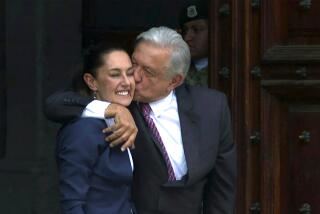Mexico Ruling Party Picks 6 Candidates : PRI Breaks With Tradition, Planning Forums for Contenders
- Share via
MEXICO CITY — In a sharp break from tradition, the ruling Institutional Revolutionary Party has announced six leading candidates for its presidential nomination and scheduled a series of forums with them.
During its 58 years of ruling Mexico, the party’s nomination has customarily been announced by the incumbent president, with no open acknowledgment of the leading candidates beforehand.
A brief statement from the party’s National Executive Committee issued to local news media Thursday night said that the six “possible” presidential candidates, in alphabetical order, are:
Mayor Ramon Aguirre of Mexico City, Interior Secretary Manuel Bartlett, Energy and Mines Secretary Alfredo del Mazo, Atty. Gen. Sergio Garcia Ramirez, Public Education Secretary Miguel Gonzalez Avelar and Budget and Planning Secretary Carlos Salinas de Gortari.
3 Front-Runners
Political analysts and the Mexican news media have universally considered Bartlett, Del Mazo and Salinas de Gortari as front-runners for the presidential nomination of the ruling party, popularly known as the PRI for its initials in Spanish.
The election of a president for a six-year term to succeed President Miguel de la Madrid is scheduled next July. The PRI has never lost a presidential race or a gubernatorial election in any of Mexico’s 31 states since it was founded in 1929.
The PRI’s statement said that top party leaders will hold meetings with the six candidates, in alphabetical order, and that the content of the meetings will be made known to “national public opinion” through the news media.
The statement did not explain the departure from custom beyond saying that the decision to announce the list was made by the party executive committee after a national tour found “reiterated opinion” of party faithful “referred to the (six) citizens mentioned as worthy of being considered for the candidacy of the PRI for the presidency of the republic.”
Autumn ‘Uncovering’
The formal destape, or “uncovering,” of the PRI’s presidential candidate still is expected to be made by De la Madrid in late September or early October.
The ruling party’s president, Jorge de la Vega, described the latest move as “a transcendental step in the history of our party,” and the influential newspaper Excelsior called it “an unequivocal indication that fresh winds are blowing over the PRI.”
Others saw the move as an effort by PRI to shore up its image without making any substantial concessions, although even some of its opponents said that the change could prove significant.
Until now, tradition has always barred presidential hopefuls within the ruling party from openly declaring their candidacies or voicing their own views on national matters until the incumbent president had selected one of them, who was then announced to the nation as the party’s choice.
Arnaldo Cordova, a federal lawmaker for the Unified Socialist Party of Mexico, the nation’s largest leftist party, said that the announcement was “an interesting innovation, although with very obvious limitations, because the phenomenon of tapadismo (veiled system) continues.”
Fewer Surprises
Cordova conceded it “was an advance, because we can listen to the possible candidates, but the country needs more than that.”
Samuel del Villar, one of Mexico’s leading political scientists, said, “The move is significant because it eliminates the possibilities of surprises.”
In previous administrations, the period before the PRI candidate was announced has been one of tension and uncertainty, with businessmen and labor leaders, and often Mexicans in general, uneasy about the prospect that an unexpected choice could lead the nation in unforeseen directions.
Moreover, the practice has led to growing criticism within the PRI from leftist and liberal party leaders who form a self-styled “Democratic Current.” This group has been pushing the name of Cuauhtemoc Cardenas, former governor of Michoacan state and son of Lazaro Cardenas, one of the most popular presidents in Mexico’s modern history, as its choice for the party’s nomination.
More to Read
Sign up for Essential California
The most important California stories and recommendations in your inbox every morning.
You may occasionally receive promotional content from the Los Angeles Times.










